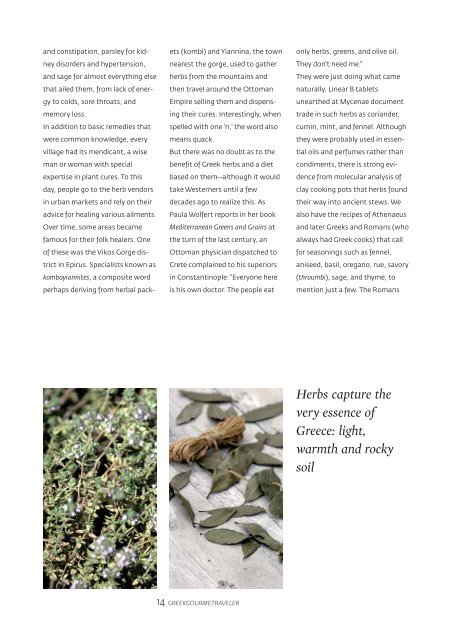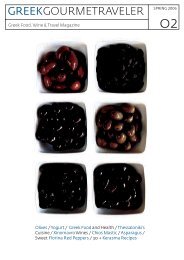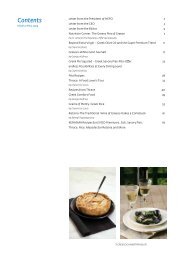Foraging for Flavor Greek Herbs/Bean Cuisine / Spa ... - Kerasma
Foraging for Flavor Greek Herbs/Bean Cuisine / Spa ... - Kerasma
Foraging for Flavor Greek Herbs/Bean Cuisine / Spa ... - Kerasma
You also want an ePaper? Increase the reach of your titles
YUMPU automatically turns print PDFs into web optimized ePapers that Google loves.
and constipation, parsley <strong>for</strong> kidney<br />
disorders and hypertension,<br />
and sage <strong>for</strong> almost everything else<br />
that ailed them, from lack of energy<br />
to colds, sore throats, and<br />
memory loss.<br />
In addition to basic remedies that<br />
were common knowledge, every<br />
village had its mendicant, a wise<br />
man or woman with special<br />
expertise in plant cures. To this<br />
day, people go to the herb vendors<br />
in urban markets and rely on their<br />
advice <strong>for</strong> healing various ailments.<br />
Over time, some areas became<br />
famous <strong>for</strong> their folk healers. One<br />
of these was the Vikos Gorge district<br />
in Epirus. Specialists known as<br />
komboyiannites, a composite word<br />
perhaps deriving from herbal pack-<br />
ets (kombi) and Yiannina, the town<br />
nearest the gorge, used to gather<br />
herbs from the mountains and<br />
then travel around the Ottoman<br />
Empire selling them and dispensing<br />
their cures. Interestingly, when<br />
spelled with one 'n,' the word also<br />
means quack.<br />
But there was no doubt as to the<br />
benefit of <strong>Greek</strong> herbs and a diet<br />
based on them--although it would<br />
take Westerners until a few<br />
decades ago to realize this. As<br />
Paula Wolfert reports in her book<br />
Mediterranean Greens and Grains at<br />
the turn of the last century, an<br />
Ottoman physician dispatched to<br />
Crete complained to his superiors<br />
in Constantinople: “Everyone here<br />
is his own doctor. The people eat<br />
14 GREEKGOURMETRAVELER<br />
only herbs, greens, and olive oil.<br />
They don't need me.”<br />
They were just doing what came<br />
naturally. Linear B tablets<br />
unearthed at Mycenae document<br />
trade in such herbs as coriander,<br />
cumin, mint, and fennel. Although<br />
they were probably used in essential<br />
oils and perfumes rather than<br />
condiments, there is strong evidence<br />
from molecular analysis of<br />
clay cooking pots that herbs found<br />
their way into ancient stews. We<br />
also have the recipes of Athenaeus<br />
and later <strong>Greek</strong>s and Romans (who<br />
always had <strong>Greek</strong> cooks) that call<br />
<strong>for</strong> seasonings such as fennel,<br />
aniseed, basil, oregano, rue, savory<br />
(throumbi), sage, and thyme, to<br />
mention just a few. The Romans<br />
<strong>Herbs</strong> capture the<br />
very essence of<br />
Greece: light,<br />
warmth and rocky<br />
soil





